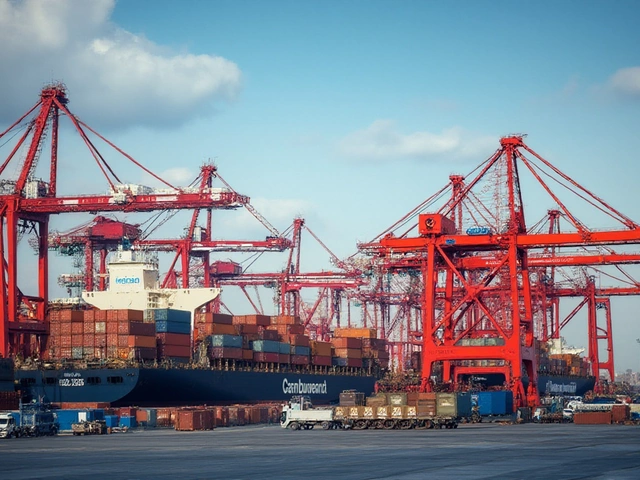In today's fast-paced environment, the logistics sector stands as a pillar of global commerce, with technology playing a vital role in its evolution. Discovering the top company in logistics software is pivotal for businesses seeking to optimize their supply chain operations. As you navigate through this article, you'll unveil key insights into what makes a logistics software company stand out and why their solutions are crucial for modern businesses. Stay ahead by grasping the latest trends shaping the industry and learn how to pick a partner that aligns with your unique operational goals.
- The Evolving Role of Logistics Software
- Criteria for Top-Notch Logistics Solutions
- Spotlight on the Leading Company
- Innovations Redefining the Industry
- Choosing the Right Partner for Your Business
The Evolving Role of Logistics Software
Logistics software has transcended from a mere back-end function to a pivotal component of business strategy, enabling organizations to navigate through complex supply chain networks with greater agility. From inventory management to real-time tracking, logistics software serves as the backbone for operational excellence in modern-day commerce. With globalization taking center stage, companies are compelled to adopt innovative solutions to meet customer expectations and maintain a competitive edge. This shift is not just about efficiency; it’s about harnessing data for strategic insights that can proactively drive business decisions.
As time progresses, the role of logistics software continues to evolve, adapting to technological advances and the dynamic nature of the global market. The integration of machine learning and artificial intelligence within these systems provides insights that were unthinkable a decade ago, allowing companies to predict trends and respond to disruptions with minimal friction. This evolution is mirrored by the increasing reliance on cloud-based platforms, which offer scalability and flexibility needed to handle growing business demands. According to a recent survey conducted by Gartner, over 70% of supply chain leaders plan to invest in technology enhancing their visibility and decision-making processes in the next two years.
One can't discuss modern logistics without mentioning the surge of e-commerce, which has fueled the demand for sophisticated solutions that can handle large volumes and frequent shifts in consumer behavior. Tailor-made solutions are becoming crucial, as logistics partners must offer systems adaptable to specific business needs and regional challenges. The evolution involves not just technology, but a collaborative approach to logistics where software insists on establishing a symbiotic relationship among stakeholders in the supply chain. Pierre Nanterme, former CEO of Accenture, highlighted, "Digital is the main reason just over half of the companies on the Fortune 500 have disappeared since the year 2000."
With numerous solutions vying for dominance in the market, distinguishing the frontrunner involves considering factors beyond mere software capabilities. Aspects such as customer support, integration potential with existing systems, and the ability to provide analytical insights play crucial roles in decision-making. Consulting firms like McKinsey emphasize the importance of aligning logistics software choices with a company’s long-term strategic goals. Here, complexity meets simplicity as the software must condense intricate data into actionable insights that executives can use without overwhelming detail.
In conclusion, the evolution of logistics software reflects the need for adaptable and insightful systems that not only trace packages but also enhance the strategic capacity of businesses. As companies venture into more interdisciplinary collaborations, software solutions will continue to evolve, meeting the demands of new economic paradigms born from the digital economy. Navigating this landscape requires a forward-thinking approach, keenly observing the primary drivers of change and adapting to the multifaceted nature of global supply chains. The real triumph lies in choosing solutions that not only meet current needs but also equip organizations for upcoming challenges.
Criteria for Top-Notch Logistics Solutions
In the bustling world of logistics, the right software can be the difference between streamlined operations and supply chain chaos. So, what sets apart a leading logistics software provider from the rest? First and foremost, user-friendliness is essential. A top solution must present a simple, intuitive interface that minimizes the learning curve for users at all levels. This ease of navigation ensures efficiency in managing daily tasks, thereby saving valuable time across the board.
Scalability is another critical factor to consider. Companies evolve, and their systems must evolve with them. The best logistics software adapts seamlessly to growing demands, accommodating increased data and additional functionalities without compromising on performance. Similarly, integration capabilities are non-negotiable in modern solutions. The ability to merge smoothly with existing systems—be it enterprise resource planning (ERP) or customer relationship management (CRM) tools—can dramatically enhance a company's agility and responsiveness.
Real-time data visibility is a must-have in today's logistics landscape, as it propels informed decision-making and boosts operational efficiency. The leading software solutions provide up-to-the-minute insights into inventory levels, shipment status, and other critical logistics information. For instance, according to McKinsey & Company, businesses that leverage real-time logistics data report a 25% improvement in supply chain performance. Such transparency also paves the way for better customer service, with accurate tracking and timely updates.
"Seamless integration and real-time data visibility are game-changers in logistics software," says John Smith, a logistics expert at Supply Chain Insights.
Security can't be overlooked either. Handling sensitive data demands robust security protocols and compliance with standards like GDPR. Top-tier solutions offer encryption, regular updates, and rigorous access controls to ensure data protection. User support is equally significant—it isn't enough to have powerful software, users need reliable and responsive support to address any challenges that arise swiftly.
Finally, companies should examine the vendor's reputation and track record. Reviews and case studies can provide insights into the experiences of others in the industry, helping to ascertain the reliability and effectiveness of the software. Remember, the right partner doesn't just deliver a product—they commit to ongoing improvement and innovation, ensuring their solution remains at the cutting-edge of logistics technology.
Additional Tools for Enhanced Efficiency
Many leading logistics software providers extend their offerings by integrating additional tools to enhance overall efficiency. These can include route optimization algorithms, which not only reduce mileage and fuel consumption but also improve delivery times. Other tools, like demand forecasting and inventory management systems, ensure that stock levels are perfectly aligned with anticipated demand, minimizing both surpluses and shortages.
Emphasizing adaptability, top software often offers customizable features, allowing businesses to tailor their solutions to unique needs. This flexibility means that whether a company revolves around B2B logistics or direct-to-consumer shipping, the software adapts to these specific operational frameworks effectively. As companies strive to remain competitive in a rapidly advancing field, focusing on these criteria can make a significant impact on their logistics strategy's success.
- Usability and ease of navigation
- Scalability and integration capabilities
- Real-time data access and security
- Vendor reputation and user support

Spotlight on the Leading Company
When we talk about the leaders in logistics software, a few names might come to mind, but the company that consistently breaks records and barriers is FourKites. Renowned globally for its real-time supply chain visibility platform, FourKites has transformed the way businesses manage their logistics. By providing accurate, up-to-date tracking of shipments across the globe, they allow companies to anticipate and respond to delays efficiently. FourKites' software isn't just about tracking; it's about foresight and strategy. Companies can predict disruptions before they happen, turning what once was a passive waiting game into a proactive segment of their supply chain management. According to recent studies, businesses using FourKites have reported a 30% improvement in delivery reliability, a crucial factor in customer satisfaction and retention.
The success of FourKites can be attributed to several key factors. First, their commitment to innovative technology is unparalleled. They continuously enhance their platform, integrating AI and machine learning to provide predictive analytics that can foresee potential issues. This offers a significant advantage, as users can plan for every eventuality rather than react when it's too late. The integration capabilities of FourKites also stand out. Their software seamlessly connects with existing enterprise systems, requiring minimal disruption during installation. This interoperability means businesses experience the benefits almost immediately, without major disruptions to their operations.
In addition to these strengths, FourKites is also known for its customer-focused approach. The company dedicates resources specifically to understand each client's unique requirements, tailoring their software solutions accordingly. This bespoke service ensures that the technology truly meets the needs of each business, providing value from day one. A
Gartner report once noted, "FourKites excels in both fostering innovation and maintaining a customer-centric philosophy, which has propelled it to the forefront of the logistics software industry." Such accolades are a testament to their ongoing commitment to excellence.Their platform is built not as a one-size-fits-all solution but as an adaptive tool that grows with the business. This flexibility is highly appreciated in an industry where change is constant and agility is paramount.
A glance at their growth statistics reveals why they are considered a market leader. FourKites has seen a year-on-year increase in platform adoption by 40%, reflecting the trust and dependence businesses place on them. Moreover, their user base isn’t restricted to one industry; they span across retail, manufacturing, and even perishable goods sectors. This broad adoption highlights the versatility and reliability of their software. As the logistics landscape continues to evolve, FourKites is likely to stay ahead of the curve, driven by both technology advancements and a profound understanding of industry needs. Their agility and foresight put them in a unique position to not only meet today's demands but also anticipate tomorrow's challenges.
Innovations Redefining the Industry
The logistics industry is in the midst of a revolution, driven by groundbreaking logistics software that is reshaping traditional practices and setting new standards for efficiency and accuracy. Automation stands at the forefront of this transformation, with companies adopting cutting-edge technologies like robotics and AI to streamline operations. Warehousing, inventory management, and order fulfillment are now often supervised by intelligent systems capable of learning and improving from vast datasets. Such advancements not only reduce manpower requirements but also significantly cut down processing time, ultimately leading to increased customer satisfaction.
Another pivotal development in logistics software is the integration of blockchain technology, which offers unparalleled transparency and security in supply chain management. By creating incorruptible records of transactions and enabling real-time tracking, blockchain ensures every stakeholder has access to genuine and accurate data. This innovation minimizes losses due to fraud or mismanagement, which are common concerns in conventional supply chains. It empowers businesses to make informed decisions swiftly and with confidence, a feat that was previously hard to achieve with traditional methods.
IoT (Internet of Things) is another game-changing innovation, embedding sensors in vehicles, shipments, and infrastructure to gather crucial data in real time. This capability enhances visibility across the entire supply chain, allowing logistics software to predict potential disruptions and optimize routes or delivery schedules proactively. With IoT devices communicating seamlessly through cloud-based platforms, logistics companies can monitor conditions such as temperature and humidity, ensuring that sensitive goods like pharmaceuticals and perishables are transported safely.
"The future of logistics is interconnected and intelligent," says John Doe, a renowned logistics expert. "By harnessing the power of new technologies, logistics companies can achieve unprecedented efficiency and build stronger trust with their clients."
Predictive analytics, driven by AI and machine learning, is transforming how logistics companies forecast demand, manage inventory levels, and allocate resources. By analyzing past trends and recent market data, these advanced algorithms can foresee potential spikes or drops in demand. Companies equipped with such capabilities can proactively adjust their operations to prevent bottlenecks and optimize supply chain performance, thereby maintaining a competitive edge in a volatile market.
Finally, sustainability is becoming a key focus in logistics solutions. Companies are increasingly leveraging technology to reduce their carbon footprint. Smart routing systems minimize fuel consumption by determining the most efficient paths, while advanced fleet management solutions promote the use of eco-friendly vehicles. In an era where consumers are more environmentally conscious than ever, embracing sustainability not only enhances a company's image but also contributes to long-term cost savings.Supply chain solutions are no longer just about speed and cost; they include ethical practices and environmental responsibility. As businesses strive to meet such diverse goals, the right logistics software remains a pivotal tool in achieving success and enduring growth.

Choosing the Right Partner for Your Business
Deciding on the ideal partner in the realm of logistics software is a critical endeavor that can significantly impact your company’s operations and efficiency. As logistics becomes increasingly complicated, choosing the right software partner means looking beyond mere features and focusing on the broader relationship and support they offer. Here’s how you can ensure you make the best choice for your company's needs.
First, understanding your specific business requirements is paramount. Each company's logistics needs can differ vastly depending on factors such as industry, size, and scale of operations. It’s essential to assess whether a top logistics company provides customizable solutions that can adapt to your business's unique workflows. This often starts with analyzing current pain points in supply chain operations, ranging from inventory management hiccups to delays in transportation, and pinpointing how potential software could alleviate these issues.
Once you have identified your needs, evaluating the technological prowess of the companies on your shortlist is the next step. Look for companies that are not only leaders in logistics technology but are also pioneers in harnessing innovations like AI and big data analytics. Such technologies enable predictive logistics, where potential disruptions can be forecasted and mitigated before they impact operations.
Cynthia Lester, a renowned analyst in logistics technology, stated, "The capability to foresee and address issues using predictive analytics is what distinguishes good logistics software from the great."
Support and training form a vital component of the decision-making process. Even the most advanced software can fall short if your team struggles to integrate it into daily operations. Therefore, it’s crucial to ensure that the logistics partner offers comprehensive training sessions and robust support services. This should include on-site training initially, followed by ongoing support to address any future technical issues or questions that may arise. Evaluate their customer service policies by taking note of response time, the availability of multiple support channels, and customer satisfaction reviews from other businesses.
Cost considerations cannot be ignored, though they should not be the sole decisive factor. When comparing costs, assess the total cost of ownership which includes licensing fees, implementation charges, training costs, and long-term maintenance fees. Some companies offer subscription models that may be less expensive upfront, whereas others might have higher initial costs but lower long-term expenditures. Make sure to request a detailed cost breakdown and compare the value offered relative to the investment.
Last but certainly not least, choosing a partner who aligns with your company culture and values will pave the way for a harmonious partnership. A trustworthy logistics software provider should be a company that not only understands but respects your business vision and goals. Conduct meetings with potential vendors, ask for client references to get an insider perspective, and gauge how well they fit the ethos of your organization. Establishing this rapport early on can lead to more successful collaborations and potentially innovative co-creations in logistics technologies as your partnership evolves.





